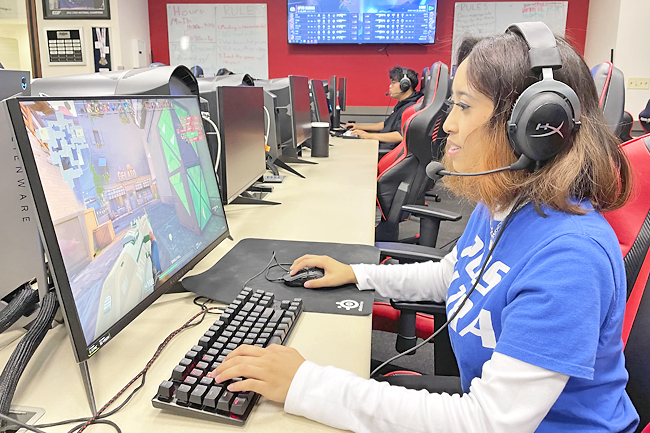CHICAGO (AP) – As a kid, Kevin Fair would take apart his Nintendo console, troubleshoot issues and put it back together again – experiences the Black entrepreneur says represented “a life trajectory changing moment” when he realised the entertainment system was more than a toy.
“I think I was just genuinely inspired by digital technology,” he said. Motivated by his love for video games, Fair learnt to code and fix computers.
In 2009, he started I Play Games!, a Chicago-based business that exposes young people of colour to a side of video gaming they might not have otherwise known existed.
By channelling students’ enthusiasm for esports – multiplayer competitive video games – schools and businesses like Fair’s aim to prepare them for careers in science, technology, engineering and math (STEM) at a time when the fields lack racial diversity.
“These kids were born with digital devices within their hands, and if you give them access, the world is theirs,” said entrepreneur and scholar Jihan Johnston, who founded digital education company Beatbotics with her teenage son, Davon – an avid gamer.
Despite industry inequality and representation issues, young video game users are diverse.
A 2015 Pew Research Center study found Black teens are slightly more likely than their peers to play video games, while roughly the same amount of white and Hispanic teens play.

Meanwhile, Black and Hispanic workers make up just nine per cent and eight per cent of STEM employees in the United States (US) respectively, Pew said last year.
Johnston is reframing the conversation about video games by coaching communities of colour on how esports can lead to careers for their children. “I think our community does not know that this can lead to college,” she said.
This school year, DePaul University in Chicago offered a new academic esports scholarship designed to hone practical skills for the video game industry. Nine of the 10 freshmen recipients are students of colour, according to Stephen Wilke, the school’s esports coordinator.
Eighteen-year-old computer science major with a focus in game design and development Aramis Reyes is one of the USD1,500 scholarship awardees.
The teen described himself as a casual, noncompetitive gamer. For Reyes, the magic of video games is the potential for storytelling.
“I have so many design ideas that I want to get into,” he said.
Skills that gamers develop help prime them for their pick of careers in IT, coding, statistics, software engineering and more, Fair said.
Typing proficiency sets up gamers to be efficient in the modern workplace, and competitive players approach the data they see on their screen analytically, thinking in frames per second.
“All of that is high-end math happening in the person’s head at the moment,” he said.
Like Fair, video games also sparked Reyes’ interest in coding. “Everything is so accessible if you know the right place to look. You know, I literally went through a secondhand store and found a book this thick on how to learn Python,” Reyes said, gesturing to show a 25-centimetre spine.
Fair said businesses like his will help close the diversity gap. Diversity in STEM would improve pay equity and invigorate innovation.
University of California Irvine research supports Fair’s strategy: a collaborative programme with the North America Scholastic Esports Federation found that school-affiliated clubs aimed at using student interest in esports in an academic context facilitated math and science learning, increased STEM interest, and benefitted kids at low-income schools the most.
Reyes, who is Hispanic and Latino, said esports feels like a welcoming community for students of colour, and is “absolutely” an avenue into improving diversity in STEM.
Although civil rights advocates said racist hate speech persists online, overwhelmingly the gaming community is accepting, in Reyes’ experience.
Sophomore Lethrese Rosete agreed, calling DePaul’s esports club “a very safe and friendly environment”.
Rosete, 20, is majoring in user design experience to combine her creativity and coding skills. She’s aware of inequality issues in STEM and video game design.
But Rosete said DePaul doesn’t feel that way. “We’re all just here to learn,” she said.
When first-person shooter game Valorant released a new Filipina character, Rosete said she screamed and ran around in excitement.
“I felt at peace,” said Rosete, who is Filipina American. “I felt like my representation had come.”
But video games are not a cure-all for the STEM diversity gap. “It’s a systemic problem that’s way bigger than esports,” Wilke said.







